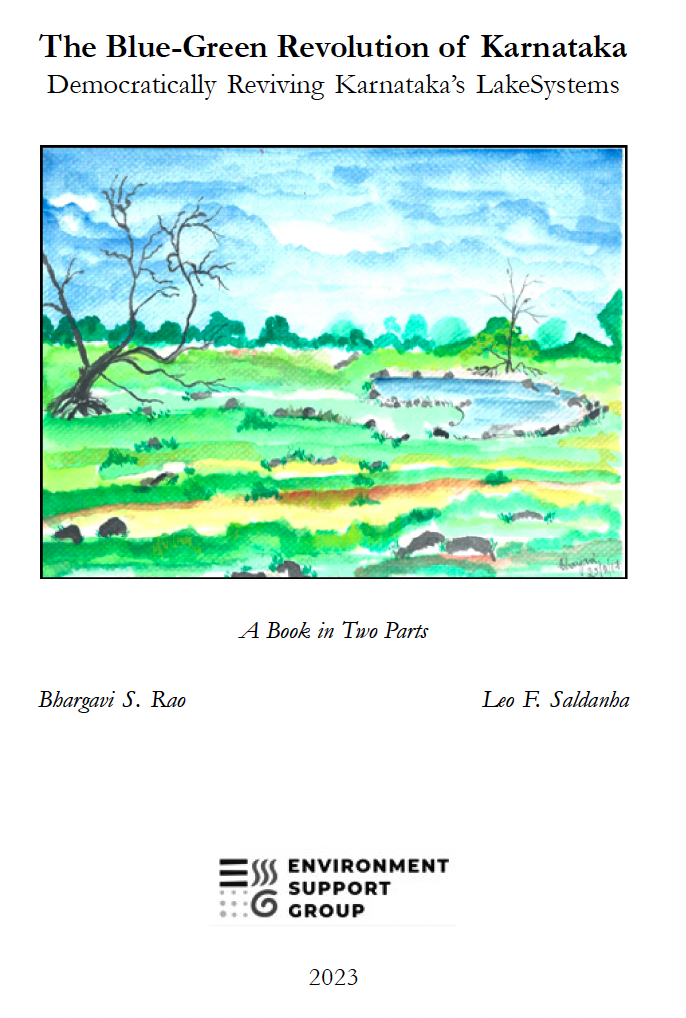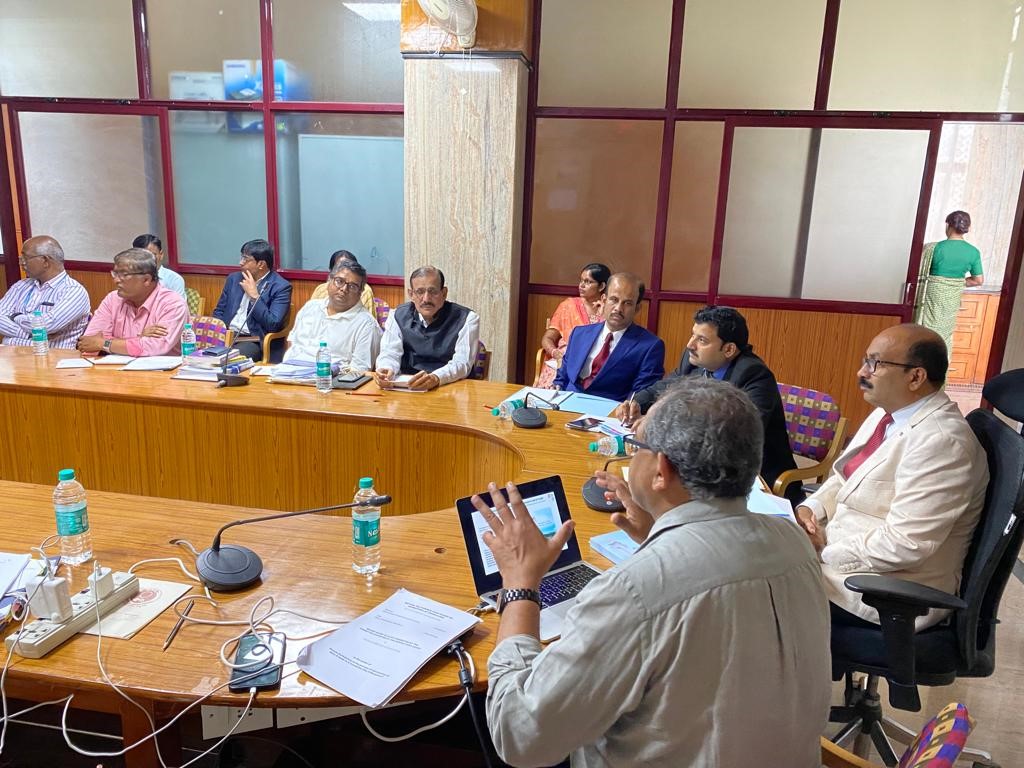Environment Justice Matters Vol. 4 Issue 13


Launch of the Blue-Green Revolution in Karnataka
We proudly present to you: “The Blue Green Revolution of Karnataka: Democratically Reviving Karnataka’s Lake Systems”, a book that contextualises ESG’s ongoing effort to protect Karnataka’s lake systems for posterity. The book will be out in a month in English and Kannada. If you would like to avail a copy, or copies, please send your contributions by using our donation link at the end of this News Digest. Contributions per copy is Rs. 400/- or USD 25/- (Postage included). Once you transfer your contribution to our account, please send an email to [email protected] with your name and address. [Please note: Indians can avail IT rebate per Sec 80G and must contribute to our Indian account – Canara Bank. Foreigners must only contribute to our FCRA linked account – State Bank of India.]
Karnataka High Court backs ESG’s PIL Initiatives

On 1st August, 2023, the High Court of Karnataka passed an order in the ongoing Lakes PIL (WP 38401/2014) directing the BBMP and other authorities to formulate a comprehensive action plan for the protection and conservation of lakes and raja kaluves across Bangalore and Karnataka. A direct outcome was a meeting of all agencies facilitated by Karnataka State Legal Services Authority (KSLSA) to formulate the action plan. ESG Team was invited to make a presentation on various initiatives and Court directives for reviving lake systems. In response, BBMP, under directions from the Chief Justice’s Bench, filed a detailed action plan for survey, conservation and rehabilitation of lakes and storm water drains in Bangalore. It’s plan to remove all encroachments in a time bound manner has been confirmed by the Court, and KSLSA will continue to monitor and report compliance.
ESG is also advancing a PIL on governance of solid waste management in the city and across Karnataka. On 11th September, 2023, the BBMP filed a status update on the implementation of the SWM Rules, 2016. This resulted in directions from the Court to BBMP to consider initiating criminal action against violators of the SWM Rules, 2016, to collect user fee from waste generators and to spread awareness on a citizen-centric approach to waste management.
Meanwhile, BBMP is planning to set up ‘kasa (garbage) kiosks’ across 76 locations in the city with colour coded bins for collection of segregated waste. BBMP has also banned single-use plastics in educational institutions and temple trusts, aligning with environmental regulations.
Corporate Accountability in Focus
The Organized Crime and Corruption Reporting Project (OCCRP) has reported that Vedanta conducted a covert lobbying campaign to weaken environmental regulations during the COVID-19 pandemic. The OCCRP has also made several allegations against the Adani Group involving over-invoicing of power equipment purchases and stock manipulation.
Karnataka’s Water Woes
A recent study conducted in Kolar and Chikkaballapur districts has uncovered alarming levels of uranium in borewell water, highlighting potential health hazards.
In Karnataka, 14 out of 75 villages have been identified as having dangerously high levels of uranium in their borewell water, raising serious concerns about the safety of drinking water for affected communities.
As monsoon has failed across Karnataka, a major part of the state is now drought affected. The State Government has announced 195 of 236 taluks of the state suffer from drought. With no major rains expected till the next monsoon’s water distress is widespread. Despite Supreme Court directions that Karnataka must release more water of the Cauvery to downstream Tamilnadu, Chief Minister Siddaramaiah has written to the Centre stating it may be impossible as Karnataka’s dams are almost empty.
Climate Change’s Adverse Social Impacts
Climate change, a study in the International Social Work journal highlights, is resulting in a troubling new trend: the surge in Child, Early, and Forced Marriages (CEFM) in the aftermath of extreme weather events like hurricanes, droughts, and floods.
Pakistan is amongst the worst affected, and is reporting increased diseases and deaths. Meanwhile across Africa, vast underground water resources face mounting pressure. And in the Pacific, Native Hawaiians are fighting for sovereignty to protect their heritage and land amid climate crisis challenges which resulted in horrific wildfires, and they point to predatory capitalists for causing this crisis.
It is now becoming clear that Canadian wildfires have emitted 1.5 billion tons of CO2, twice Canada’s combined emissions from various sectors. Since 2001, Canada’s forests have turned from carbon sinks to sources, with a 50% emissions increase in the 2020s, primarily due to logging and climate shifts.
As India grapples with the looming threat of a threefold increase in groundwater depletion projected between 2041 and 2080, the consequences of climate change are becoming increasingly evident. Climate variability is anticipated to heighten crop water demand, compelling farmers to resort to intensified irrigation practices in order to adapt to evolving environmental conditions. In this context, the significance of electricity as the predominant power source for water extraction, as highlighted by the Minor Irrigation Census (MIC), assumes importance.
Global Policy & Legal Developments
The Africa Climate Summit (ACS23) which took place in Nairobi on 4th – 6th September, resulted in the ‘Nairobi Declaration,’ unifying Africa’s stance on climate change ahead of global engagements.
World Intellectual Property Organization (WIPO) met on September 8, 2023 to discuss a new treaty regarding Intellectual Property and Genetic Resources, Traditional Knowledge and Folklore. This new treaty, if agreed upon, is projected to ensure benefits to indigenous communities that have protected genetic resources. However, there are concerns about serious gaps in disclosing digital sequencing information and over granting access to documented information to global researchers – considered a major pathway to biopiracy. All this in the context of India having emasculated its Biodiversity Act.
Small island nations are bringing a historic climate justice case to the UN maritime tribunal in Hamburg, Germany, starting on September 11, 2023, stating that high-emitting nations should be held accountable for greenhouse gas emissions absorbed by the ocean and are seeking clarification on international obligations for marine environment protection.
Environmental Challenges
According to the Air Quality Life Index (AQLI) released by the Energy Policy Institute at the University of Chicago, individuals living in Delhi may experience a staggering loss of 11.9 years of life due to pollution levels that exceed the limits set by the World Health Organization.
In an effort to tackle the Great Pacific Garbage patch, spanning over 1.6 million square kilometres of the Pacific Ocean, Ocean Cleanup has successfully removed 11,000 kg of ocean waste.
Companies, like Kia, are planning to convert 55 tons of ocean trash for use in its electric vehicles as part of its carbon neutrality commitment. Apple also put out an interesting report of its ESG compliance. However, given grave social and environmental impacts of lithium and rare earth mining in producing electronic goods and electronic vehicles that flood the market, the environmental viability and impact on human rights of such ‘green’ projects is in question. Read how discovery of massive lithium deposits in a volcano in USA is threatening Native American populations.

Human Rights and Constitutionalism
Over 200 individuals gathered at Town Hall, Bengaluru to take a solemn pledge against hate crimes.
Millions enthusiastically took Karnataka Chief Minister’s invitation to read the Preamble of India’s Constitution on International Day of Democracy. At ESG, we decided to proudly display the Preamble on our workspace for all to read.
Deadly Costs of Extractivist ‘Development’
In the Bauxite belt of Odisha, Niranjan and 22 others from marginalised Dalit and Adivasi communities, faced arrests, highlighting how violent mining is in the state. And in a shocking development, Goldman Awardee Prafulla Samantara was kidnapped, suspectedly by police themselves, for his opposition to mining projects and forest diversion.
The frenetic pace at which India is promoting renewable energy appears to be taking place without any environmental and human rights safeguards. Pavagada Solar Park is a classic example of how the extractivism and violence of fossil fuel based energy systems is being reproduced, according to this analysis from Pulitzer Centre, which quotes Bhargavi Rao of ESG. Karnataka Renewable Energy Development Limited (KREDL), meanwhile, has invited bids from consultancy firms to develop a 500MWAC capacity solar park in Aurad Taluk, Bidar district of Karnataka, while there are plans to double the scale of the Pavagada project.
As India envisions a diverse energy landscape, incorporating hydro, nuclear, solar, wind, and bioenergy, there are growing concerns about large-scale renewable energy projects encroaching on agricultural and ecologically sensitive land, which pose environmental and socio-ecological risks.
And in the case of the legacy burden of iron ore mining in Kudremukh forests in Western Ghats, “KIOCL requests the government of Karnataka to consider an application for raising the height of Lakya dam from 65 metres to 100 metres”, which means more submergence of forests and also “grant ex-post facto approval for forest clearance and drop/waive off all claims”. ESG initiated efforts in 1997 to stop mining in this forest, where three rivers take birth, efforts that were eventually successful following intervention from the Supreme Court. See more about ESG’s efforts to protect Kudremukh and its 2000 note ‘White Elephant in a Green Forest’.
Good news!
In the heart of Assam’s forest ranges, AVA, a handloom venture, empowers over 400 women, offering them livelihoods while actively promoting forest conservation by reducing their dependence on forest resources. In Uttarakhand, the Forest Department has taken a stand against environmental disruption by preventing the installation of a 100kg Dhanvanthari statue in the Himalayas by the Patanjali team.
In the Brazilian Amazon efforts to combat deforestation have yielded positive results with a 66 percent reduction in deforestation observed in August compared to the previous year – highlighting the rapid progress made by Lula administration over that of destructive Bolsanaro. Meanwhile, India’s commitment to restore 21 million hectares of forest by 2030 under the Bonn Challenge reflects ongoing restoration efforts, aiming to counteract past deforestation.
In parallel, as concerns mount over the dilution of the Forest Conservation Act and its potential for corporate exploitation under the guise of development, Nagaland’s state assembly has rejected these amendments, invoking Article 371A to protect tribal customs and local autonomy from national legislation. This is the second state to reject India’s dilution of forest laws, after Mizoram.
Urban Commons
The diminishing green spaces in cities raise concerns not only from an ecological standpoint but also in terms of access and space utilisation, often overlooking vulnerable groups’ needs.

And it appears that even reading books in parks is a crime!! As book readers discovered when attempting to meet in Bangalore’s Lalbagh gardens. See what Leo Saldanha of ESG feels about this unbelievable move by the Horticulture Department of Karnataka here.
Farmers and GM Crops
The Coalition for GM-Free India (CGMFI) has raised concerns over the open-air release of genetically modified (GM) crops and genome-edited organisms in Tamil Nadu and urged the Tamil Nadu government to take a policy stance against such releases, citing potential negative effects associated with GM crops. This call highlights the ongoing debate over GM crops and their implications.
Bharat BEEJ Swaraj Manch (India Seed Sovereignty Alliance) issued a Final declaration in the backdrop of Food and Agriculture Organisation’s First Global Symposium on Farmers Rights that was held in New Delhi last week. Farmers movements and networks have also released the Draft Framework on Farmers’ Rights.
PM Modi’s silence on Bhopal Crimes
US President Biden’s attendance at the G20 provided Prime Minister Narendra Modi the ideal opportunity to directly address Dow and the US DoJ’s scofflaw contempt for Indian justice in tackling the crime’s of Union Carbide/Dow in the 1984 Bhopal Gas Crime. India’s staging of the G20 offered an unprecedented opportunity for PM Modi to join the principled stand of the 12 US Congress members demanding accountability. But there was not a word on this from the Indian PM to US President. India’s deafening silence about a US Corporation’s crime that killed thousands in Bhopal, maimed hundreds of thousands, and continues to congenitally destroy families, is shocking, to say the least.
Upcoming Events
Centre for Child and the Law(CCL) is hosting a two-day national consultation titled “A Decade of the Food Security Law in India : Reflections and Way forward” on 20th and 21st September 2023 at National Law School of India University, Bangalore. This consultation will focus on food systems, water, climate change and governance. Click here for more details.
[This volume of Environment Justice Matters has been compiled by Yashaswini Sundar, Sneha Surendra & Nidhi Hanji]
We wish you Ganesh Chaturthi, the celebration of a God who reveres nature. Ganesha would love it if you don’t make him out of plaster of paris, or paint him. He prefers to be a natural. Also, he would be grateful if you don’t immerse him in lakes; he is quite happy in a little temporary pond you can dig to immerse him.

Environment Support Group (Trust)
1572, Dr. Puneeth Rajkumar Ring Road
Banashankari II Stage, Bangalore 560070, INDIA
Tel: 91 80 26713560
Website: esgindia.org | Email: [email protected]
ESG is registered to secure support under the Corporate Social Responsibility (CSR) scheme of the Ministry of Corporate Affairs.
Environment Support Group (ESG) is eligible to receive foreign donations/grants per the Foreign Contribution Regulation Act (FCRA)
All donations to ESG from Indians are eligible for tax exemptions as per Sec. 80G of the Income Tax Act.
More details about ESG’s Financial Reports and Statutory Approvals are accessible here.
Your Monetary Contributions Keep Us Working
Visit our Support Page here.
Contributions from Indians/Domestic Donors
(QR CODE IS FOR INDIAN DONORS ONLY)
Bank details given below:
SB Account Number: 0-4-0-9-2-0-1-0-0-3-7-1-5-1
Account Name: Environment Support Group
Bank Name: Canara Bank
IFS Code: CNRB0010409
Bank Branch: Jayanagar 3rd Block
Bank Address: 69, 9th Main, 3rd Block, Jayanagar, Bangalore 560011
Post donation, please share name, address and donation details to [email protected]
along with PAN – statutory requirement.
Contributions from Foreigners/Foreign Organisations
Account Number: 40113324601 (FCRA SAVINGS ACCOUNT)
Account Name: Environment Support Group
Branch Code: 00691
IFSC: SBIN0000691
SWIFT: SBININBB104
Bank Address: FCRA Cell, 4th Floor, State Bank of India, Sansad Marg, New Delhi Main Branch, New Delhi-110001
Post donation, please share name, address and donation details to [email protected].

